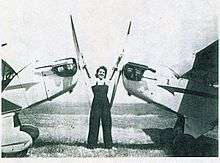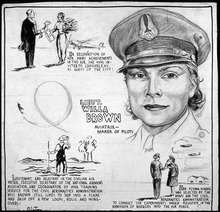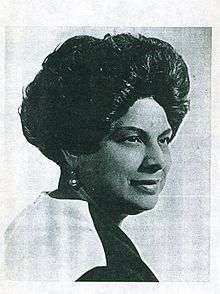Willa Brown
| Willa Brown | |
|---|---|
 Brown as a lieutenant in the U.S. Civil Air Patrol | |
| Born |
January 22, 1906 Glasgow, Kentucky |
| Died |
July 18, 1992 (aged 86) Chicago, Illinois |
| Nationality | American |
| Occupation | Pilot, Lobbyist, Activist, Teacher |
| Known for | Civil Rights Leader, first African American Officer in the US Civil Air Patrol, first African American woman to run for United States Congress |
| Spouse(s) |
Wilbur Hardaway Cornelius Coffey Rev. J. H. Chappell |
Willa Beatrice Brown (January 22, 1906 – July 18, 1992) was an American aviator, lobbyist, teacher, and civil rights activist.[1] She was the first African-American woman to earn her pilot's license in the United States,[2] the first African-American woman to run for the United States Congress, the first African-American officer in the US Civil Air Patrol, and the first woman in the United States to have both a pilot's license and a mechanic's license.[3] A lifelong advocate for gender and racial equality in flight and in the military, Brown not only lobbied the U.S. government to integrate the U.S. Army Air Corp and include African Americans in the Civilian Pilot Training Program (CPTP), but also co-founded the Cornelius Coffey School of Aeronautics with Cornelius Coffey, which was the first private flight training academy in the United States owned and operated by African Americans. She trained hundreds of pilots, several of whom would go on to become Tuskegee Airmen.[4]
Well after the Coffey School closed in 1945, Brown remained politically and socially active in Chicago. She organized flight schools for children, she ran for Congress three times (1946, 1948, and 1950, respectively), she was an active member of the Westside Community Church, and she taught in the Chicago Public School System until 1971, when she retired at the age of 65.
Early life
Willa Brown Chappell was born in Glasgow, Kentucky.
In 1927, she graduated from Indiana State Teachers College with a degree in business. She received an M.B.A. from Northwestern University in 1937.[3]
As a young high school teacher in Gary, Indiana, and later as a social worker in Chicago, Willa Brown felt that her talents were not being used to their greatest use; she sought greater challenges and adventures in life, especially if they could be found outside the limited career fields normally open to African Americans.

Aviation career
She decided to learn to fly, studying with Cornelius Coffey, a certified flight instructor and expert aviation mechanic at one of Chicago's racially segregated airports. In 1938, she became the first African American woman who earned a private pilot's license in the United States.[5] (Fellow Chicagoan and aviator Bessie Coleman had to go to France for her license in 1921).[6] Later, Brown and Coffey married and established the Coffey School of Aeronautics at Harlem Airport in Chicago, where they trained black pilots and aviation mechanics.
Together with Cornelius Coffey and Enoch P. Waters, Willa Brown helped form the National Airmen's Association of America in 1939, whose main goal was to get black aviation cadets into the United States military. As the organization's national secretary and the president of the Chicago branch, Brown became an activist for racial equality.

She continually lobbied the government for integration of black pilots into the segregated Army Air Corps and the federal Civilian Pilot Training Program (CPTP), the system established by the Civil Aeronautics Authority to provide a pool of civilian pilots for use during national emergencies. Subsequently, when Congress finally voted to allow separate-but-equal participation of blacks in civilian flight training programs, the Coffey School of Aeronautics was chosen for participation in the CPTP.
Brown became the coordinator for the CPTP in Chicago. Later, her flight school was also selected by the U.S. Army to provide black trainees for the Air Corps pilot training program at the Tuskegee Institute.
Willa Brown eventually became the coordinator of war-training service for the Civil Aeronautics Authority and later was a member of the Federal Aviation Administration's Women's Advisory Board. She was the first black female officer in the Civil Air Patrol and the first black woman to hold a commercial pilot's license in the United States.[7]
In 2010, Brown was awarded the Distinguished Alumni Award by the Indiana State University Alumni Association.

References
- ↑ "Brown, Willa". American National Biography. Oxford University Press. Subscription needed.
- ↑ Davis, Edmond. "Brown, Willa B. (1906–1992)". The Black Past. Retrieved 2016-02-09.
- 1 2 Freydberg, Elizabeth Hadley (1994). "Brown, Willa Beatrice (1906–1992)". Black Women in America: An Historical Encyclopedia. Bloomington: Indiana University Press. pp. 184–185. ISBN 0-253-32774-1.
- ↑ Kelli Grant. "Our History | 99s in Aviation History | Women in Aviation". The Ninety-Nines, Inc. Retrieved February 9, 2016.
- ↑ AOPA Pilot: 41. May 2014. Missing or empty
|title=(help) - ↑ Editorial Board (January 19, 2015). "Chicago and the Tuskegee Airmen". Chicago Tribune. Sec. 1. p. 14.
- ↑ USAF Factsheet